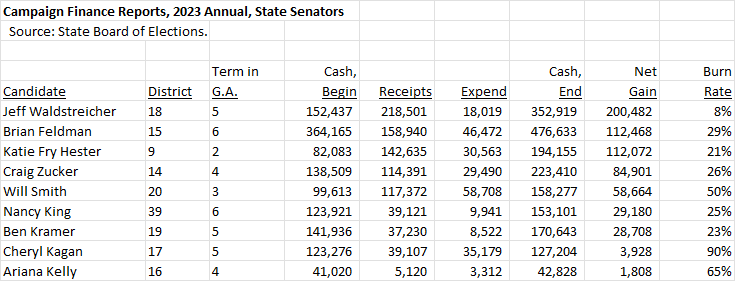By Adam Pagnucco.
January’s campaign finance reports are in and all of Montgomery County’s state senators and delegates have reported. What can we learn about them?
First, a few comments. The new reports cover the period of January 12, 2023 through January 10, 2024. That matches the day after the start of last year’s general session through the first day of this year’s general session. State legislators are prohibited from raising money for state accounts during session. They can raise money for other offices, like Congress.
It’s the first year of the term, and normally, that’s a sleepy year with elections not due until 2026. We would not expect to see much fundraising in the first year. Also, eight delegates were in their first year and of those, four were appointed. These delegates – and especially the appointees – are still building their fundraising networks.
With all of the above stated, here are the fundraising totals for the senators organized by net gain for the period. Burn rate is the percentage of receipts that are spent. It’s important to keep that low in the early going. Here is a case study of what can happen to candidates who fail to do that.

Senator Jeff Waldstreicher (D-18) is the runaway leader among the delegation. His net raise was nearly twice as much as the second-place finisher. I have a lot to say about Waldstreicher in an upcoming post dedicated to him. For now, just bear in mind how large the gap is between him and everyone else.
Senator Brian Feldman (D-15) is a prodigious fundraiser for two reasons. First, his district (15) contains Potomac and is one of the wealthiest districts in the state. And second, he chairs the Senate Education, Energy, and the Environment Committee, which has a hugely important issue portfolio. The fact that it covers licensing and regulation of businesses all by itself guarantees tons of attention from interest groups – and money too. Finally, Feldman has the largest cash balance in the delegation because he has not had a truly competitive race since he was first elected as a delegate in 2002.
Senator Katie Fry Hester (D-9) is third in net gain. Much of Hester’s district is in northern Howard County, where Republicans do well. It also includes Ellicott City and Damascus to protect her from the GOP. Her seat is one of a handful of competitive senate seats in the state so Hester needs to raise money to survive.
Here are the fundraising totals for the delegates organized by net gain for the period.

Delegate Jheanelle Wilkins (D-20) is the leader in net gain among the delegates. One of my sources commented, “If you want a bill passed in the House now, you have to go through the Black Caucus first.” Wilkins became interim chair of the caucus in September 2022 and was made full chair in January 2023. Her fundraising reflects the caucus’s power as well as Wilkins’s rapid personal ascent. Is she a future speaker?
Delegate Marc Korman (D-16) is a committee chair, represents Bethesda, works hard at everything (do you sleep, Marc?) and is widely respected from MoCo to Annapolis and beyond. I am so spoiled by Korman that I expect him to make any list like this.
Delegate Sarah Wolek (D-16) is brand new, having been appointed to the House in March 2023. Just look at what she did, tallying lots more money than colleagues with much more seniority and keeping her expenses rock bottom. Any politician will tell you that money does not walk in the door all by itself, so Wolek put in some hard work. How much could she raise for the rest of the term?
As for the legislators who had high burn rates and/or small raises, you have two and a half years to get to work. Use them well or you could risk being perceived as vulnerable to challenge.
As stated above, I will have more to say about Waldstreicher’s fundraising because it’s so remarkable, at least at this point in the cycle. But first, we will have a look at the county’s elected officials.
